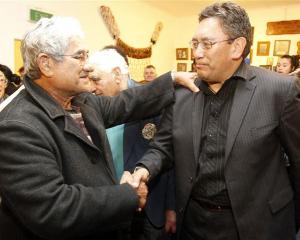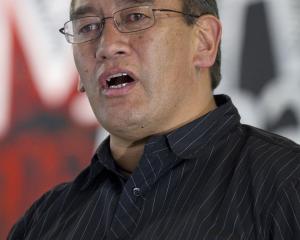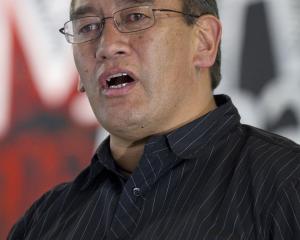The one politician to emerge safely from the Hone Harawira tragi-comedy has been Act New Zealand party leader, Rodney Hide.
Mr Hide's serial hypocrisy over the baubles of office rapidly disappeared from public attention once the Maori MP's apparent attitudes towards white New Zealand became public and he showed little sign of resiling from them.
For a month now, Mr Harawira's warrior-like stance has occupied much of the chattering end of the media, and, while the favourite combatant of a notably combative tribe has permitted the shadow of contrition to pass over his defiance, he will not have lost "mana" in his home territory; indeed, he will have enhanced it.
For the price of several pronouncements extracted from him in the form of "apologies", and a token repayment to the state for abusing its generosity, Mr Harawira remains within the Maori Party - the only present vehicle in which he has any hope of a political future - continues to be the MP for Te Tai Tokerau, will not be officially taken to task for inflammatory racist comments, and can enjoy an enforced summer holiday in the "winterless north" to savour the fruits of his undoubted victory.
At least the general voter now knows Mr Harawira's resentments are firmly seated, and that by implication if not by direct endorsement, his Maori Party colleagues and members sanction them.
There was little inkling in his various "apologies" that he acknowledged the character of his comments, a quality essential for any apology to have sincerity.
This may be explained by the MP's conviction that racism is "based on the power to impose your racial views on the rest of society" and that, as he does not have any power as an individual, his comments cannot be racist.
As an escape clause for the accountability of those who would freely express their prejudices, this takes the biscuit.
One senses that if Mr Harawira is sorry at all, he is sorry only that he got himself into trouble.
His invective was racist, the language he used obscene and deeply offensive, and his challenge to its recipient to make it public shamelessly arrogant.
But can anyone with a reasonable knowledge of Maori political activism of the past 30 years really be surprised? The appearance at his side in a supporting role of the former MP Donna Awatere Huata simply reinforces the point.
The fact is the grandmotherly figure of Tariana Turia and the moderating "spin" of the politically astute Pita Sharples have led to an indifference about the Maori Party and its long-term Treaty of Waitangi-based objectives.
The co-leaders have commendably presented the party as one seeking national unity and goodwill, but there remain among its supporters, especially the younger males, great frustration that political progress in a democracy means accommodation, not revolution.
It is to this cohort that the likes of Hone Harawira appeals, and is bound to be the reason why his latest, less equivocal, "apology" specifically included to "all young Maori".
The fact that his private opinions have by his own actions become public is, however, to the electorate's advantage; after all, how many MPs we choose to represent us truly speak their minds, rather than mouth the party line?
Persuading Mr Harawira to eat humble pie was most likely the reason for the length of time this affair attracted public attention; the contrast with Rodney Hide's urgent and abject mea culpa could not have been greater.
Using a political junket to include a day or two of taxpayer-funded private sightseeing, and later supplying a hot-headed explanation to a supporter, are hardly crimes of great moment, yet the response from some non-Maori quarters has been little short of hysterical.
Is it too uncomfortably close to the bone to ask why?
Numbers always matter in politics, a reality which eventually dawned on the Maori Party's leaders: without the support of Mr Harawira's electorate and national endorsement by the party, he could not be expelled; if a by-election was somehow to be forced, he would win it, and doubtless attract followers to a new Harawira Party - a fearful prospect.
In its statement about the affair, the party said it had "found the strength to exercise compassion while reminding ourselves of the need for individual and collective discipline - mana motuhake - and of the high expectations of our membership of us as Maori Party members of Parliament".
New Zealand politics has not had an extremist of Harawira dimensions since Winston Peters.
The Maori Party would do well to remember Mr Peters' - and New Zealand First's - fate should Mr Harawira's radicalism again get the better of it.







